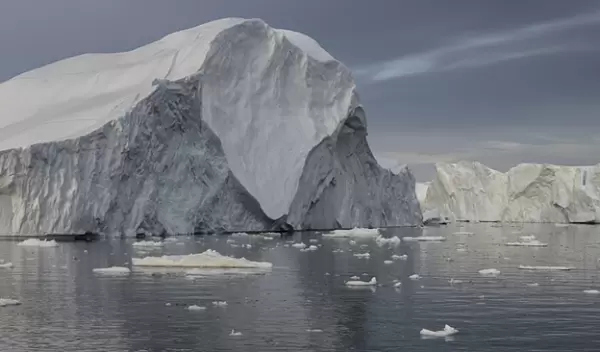
Massive iceberg discharges during the last ice age had no impact on nearby Greenland
During the last ice age, massive icebergs periodically broke off from an ice sheet covering a large swath of North America and discharged rapidly melting ice into the North Atlantic Ocean around Greenland, triggering abrupt climate change impacts across the globe.
These sudden episodes, called Heinrich events, occurred between 16,000 and 60,000 years ago. They altered the circulation of the world's oceans, spurring cooling in the North Atlantic and impacting monsoon rainfall around the globe.
But little was known about the events' effect on nearby Greenland, which is thought to be very sensitive to events in the North Atlantic. A U.S. National Science Foundation-supported study by Oregon State University researchers, published in the journal Nature, provides an answer.
"It turns out, nothing happened in Greenland, the temperature stayed the same," said the study's lead author, Kaden Martin. Instead, the researchers found that the Heinrich events caused rapid warming in Antarctica, at the other end of the globe.
The scientists anticipated that Greenland, near the ice sheet, would have experienced some kind of cooling. To find that these Heinrich events had no discernible impact on temperatures in Greenland is surprising and could have repercussions for the understanding of past climate dynamics, said study co-author Christo Buizert.
"If anything, our findings raise more questions than answers," said Buizert, who uses ice cores from Greenland and Antarctica to reconstruct and understand the Earth's climate history. "This really changes how we look at these massive events in the North Atlantic. It's puzzling that far-flung Antarctica responds more strongly than nearby Greenland."
The impact of Heinrich events on Greenland and Antarctica was not well understood, spurring Martin and Buizert to try to find out more about what was happening in those parts of the world.
"When these big iceberg discharges happen in the Arctic, we now know that Antarctica responds right away," Buizert said. "What happens in one part of the world influences the rest of the world. This inter-hemispheric connection is likely caused by change in global wind patterns."
"This surprising and important outcome illustrates the benefit of carefully preserving ice cores so new analytical techniques combined with better precision and time resolution can expose unseen dynamics in the climate system," said Paul Cutler, a program director in NSF's Office of Polar Programs.
